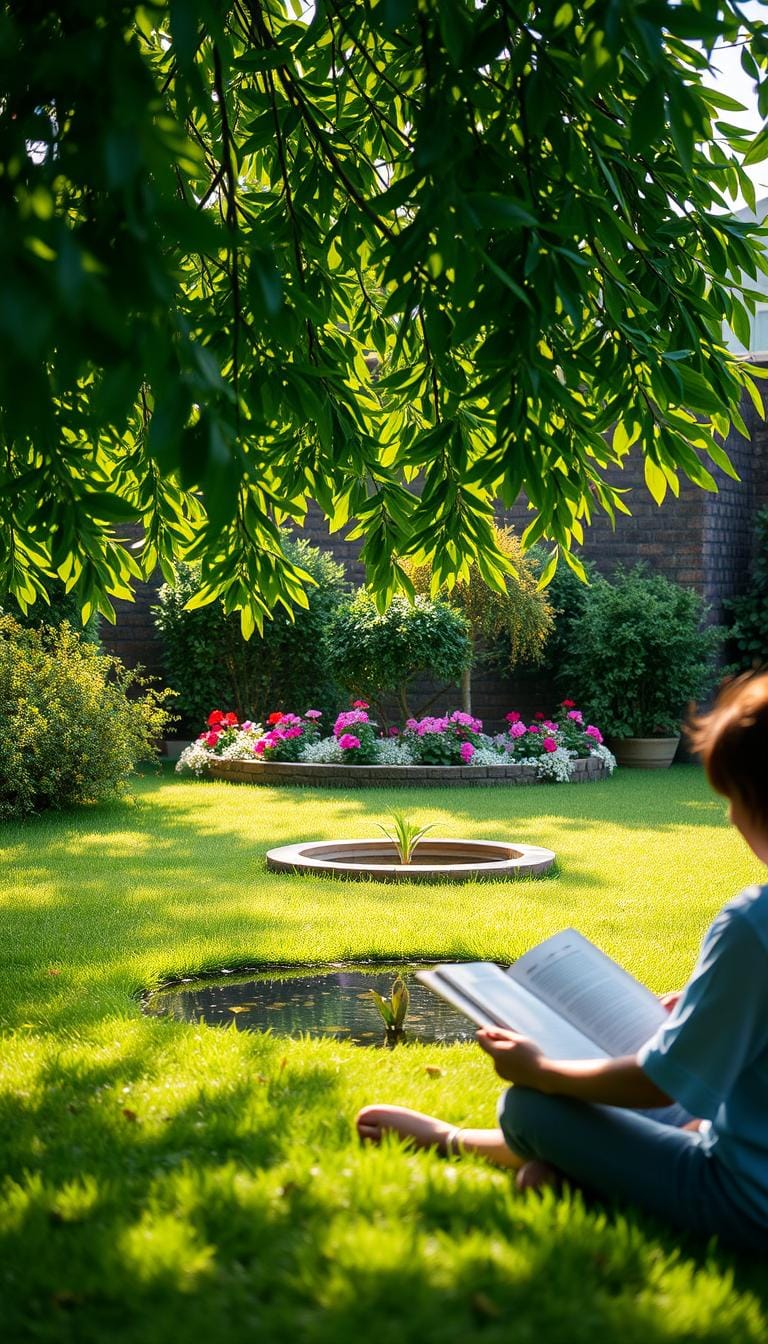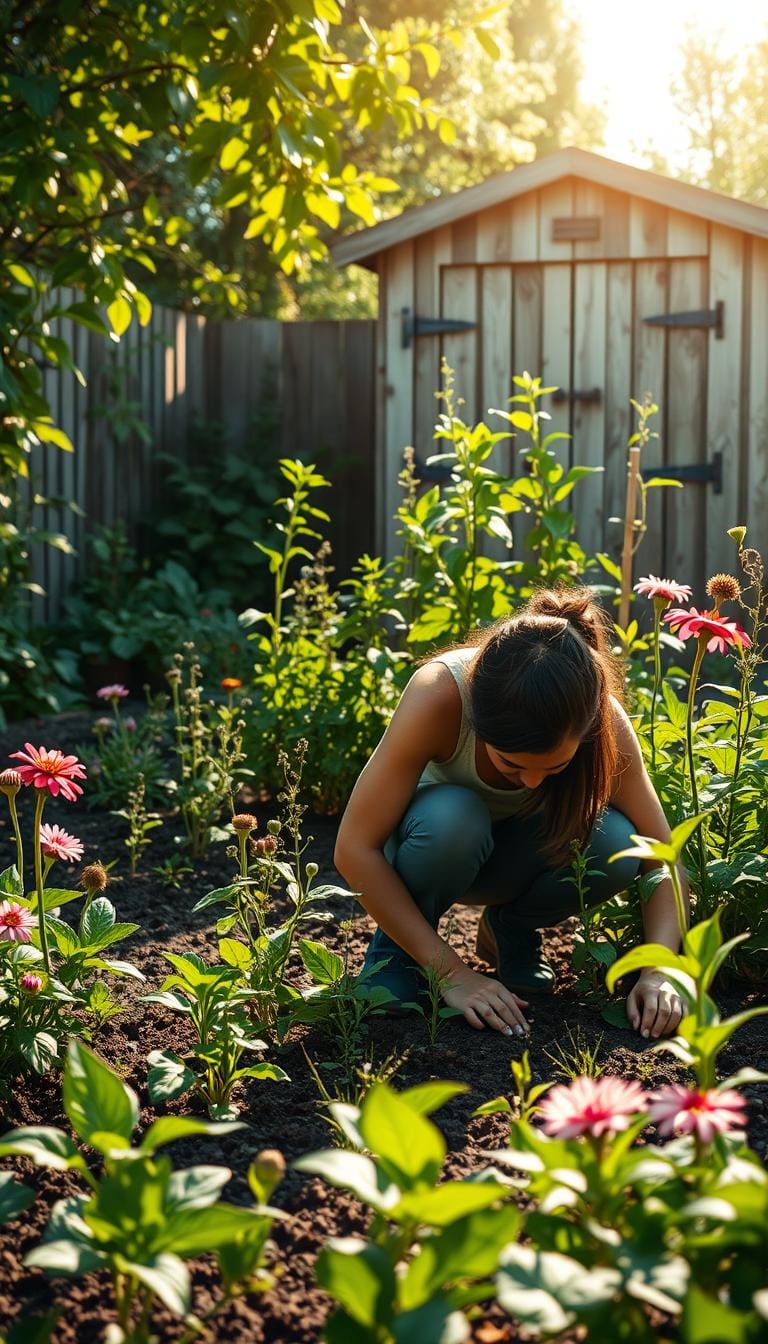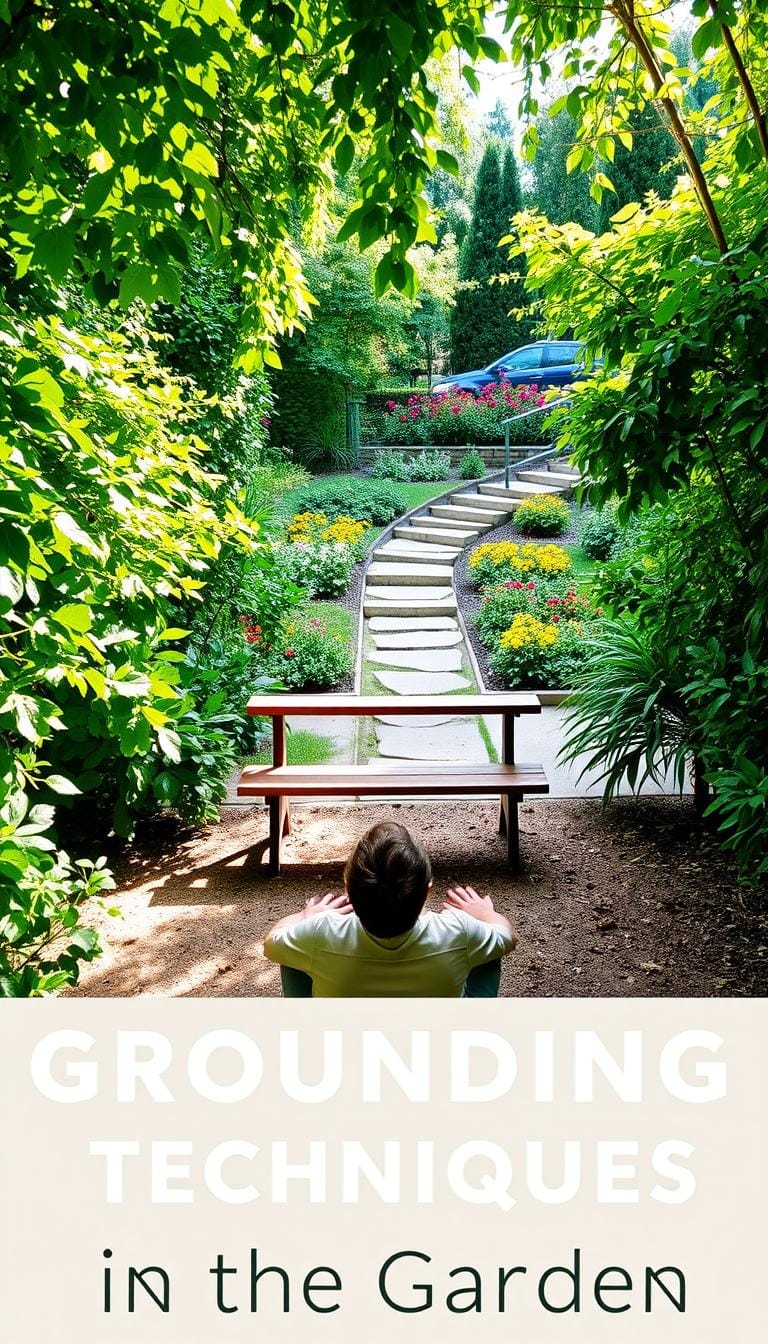Gardening to Improve Focus: 7 Signs It’s Sharpening Your Mind
Table of Contents
When I first picked up a trowel, I never guessed gardening could change how I think. Now, after months of digging, planting, and tending to my garden, I’ve noticed surprising shifts in my focus. This journey isn’t just about growing plants—it’s about discovering how gardening to improve focus works in real life.

My days spent weeding or watering taught me more than soil care. Simple tasks like pruning or arranging seedlings forced my mind to stay present. Over time, I tracked seven clear signs that my concentration and clarity had grown sharper. This article shares those moments, showing how gardening to improve focus can become a natural mental workout.
My Journey Into Gardening
A few years ago, I started gardening to get away from daily noise. It turned into a way to change how I think and work. Gardening showed me benefits for focus that were hard to ignore.
Why I Started Gardening
I began with a small herb garden on my balcony. Work stress made me feel scattered. I wanted something calming.
Planting seeds was grounding. I picked easy plants like basil and mint. They needed regular care but were simple to handle. This routine helped me clear my mind.

Noticing the First Signs
At first, the changes were small but steady. I could focus longer without getting distracted. Here’s how things changed:
| Before Gardening | After Gardening |
|---|---|
| Struggled to stay on task for more than 20 minutes | Completed 1-hour projects without feeling overwhelmed |
| Felt mentally foggy by afternoon | Retained clarity even after long work hours |
Gardening wasn’t just about being productive. It was like active meditation. The routine of watering or pruning improved my focus. Now, gardening is a daily tool for mental clarity.
Unexpected Mental Boosts from Gardening
I never thought pulling weeds could be like meditation. But, I found that gardening’s repetitive tasks sharpen my focus. Activities like arranging seedlings or pruning bushes keep my mind on the present. This helps me block distractions and find creative solutions to problems.

Simple garden tasks offer big mental benefits. Here’s how common garden activities improve focus:
| Task | Focus Benefit |
|---|---|
| Weeding rows | Teaches patience and attention to detail |
| Sowing seeds | Encourages planning and steady hand-eye coordination |
| Watering plants | Creates a calming rhythm to reset mental fatigue |
| Harvesting vegetables | Boosts problem-solving when deciding ripeness |
One morning, while planting tomatoes, I solved a work problem. The focus on soil depth helped me organize my thoughts. Even small wins, like spotting a new sprout, give my brain a break. These moments show that gardening’s mental benefits often surprise us.
My Experience with Gardening to Improve Focus
While planting herbs and caring for seedlings, I found gardening’s hidden strength. It brought focus to moments once filled with distractions. The mental health perks of gardening were a surprise—simple tasks turned into mental exercises.
Every action in the garden required my full attention. Here’s how it changed my thinking:
- Watering plants in the morning helped me stay focused, training my mind to concentrate.
- Sorting seeds by color and size sharpened my organizational skills, turning it into a puzzle.
- Watching seedlings grow day by day taught me patience, helping me not rush through tasks.
Better Concentration Moments
Gardening’s repetitive tasks, like weeding or mulching, made me slow down. My mind stopped racing. Tasks that once felt too big, like planning a project, became doable. Even small achievements, like aligning tomato stakes, boosted my confidence in tackling bigger goals.
Improved Mental Clarity
Clarity came unexpectedly. Walking through my garden, I’d brainstorm ideas or solve problems. The physical act of digging or trimming was like a reset button. Gardening reduced distractions, making my to-do lists feel lighter. I started tackling tasks one at a time, instead of getting lost in stress.
These changes took time. But over weeks, the garden became my mental anchor. Tasks that were once done on autopilot now required mindful effort. It built my focus muscle, bit by bit.
Mindfulness Through Gardening Techniques
Gardening tips for better focus come alive when you approach tasks with intention. Every seed planted becomes a moment to breathe deeply and tune out distractions. I discovered that slowing down transformed chores into mindful exercises.
Integrating Mindfulness Into My Routine
I started small. Now, I pause before digging to notice the sun’s warmth on my skin or the smell of damp earth. Here’s what works:
- Water plants slowly, focusing on each drop touching soil.
- Label seedlings aloud to anchor attention in the present.
Finding Zen in Nature
Watching seedlings push through soil taught me patience. I now spend mornings sipping coffee while tracing leaf patterns. These quiet moments quiet my mind, making daily decisions easier. Even weeding became a meditation—I concentrate on pulling each weed fully, letting go of mental clutter. Nature’s rhythms remind me to stay grounded. The garden’s quiet beauty is my daily reset button.
The Surprising Benefits of Gardening for Focus
Gardening is more than just growing plants. It’s a daily practice that sharpens focus through mindfulness gardening techniques. I found that simple tasks like arranging seeds or checking soil moisture are mental workouts. Every decision, from spacing plants to adjusting sunlight, requires careful attention that quiets distractions.
Simple actions become mindful rituals. Watering plants slowly makes me pause and notice details, like leaf textures or root health. This mirrors meditation, calming my racing thoughts. Over time, these habits trained my brain to tackle tasks with laser-like concentration.
- Seed sowing teaches patience as I wait weeks for sprouts, fostering goal-oriented focus.
- Weeding becomes a grounding task, sorting priorities between plants and unwanted growth.
- Seasonal planning encourages strategic thinking, linking short-term actions to long-term harvests.
These practices turned my garden into a mental training ground. Tasks like pruning or rearranging pots became micro-meditations, sharpening my ability to stay focused during work or daily chores. The mix of physical activity and mindful observation creates a rhythm that strengthens mental clarity naturally.
How Gardening Helps With Concentration in Daily Life
Gardening teaches the mind to stay in the moment. After months of caring for plants, I noticed better focus at work and home. Tasks like watering and checking for pests require focus, skills that help in daily life.
Even small garden tasks, like counting seeds or moving pots, improve mental discipline. These activities help fight stress and increase clarity.
Anecdotes From My Garden
Last spring, I was struggling to meet a deadline. Gardening helped me clear my mind. I focused on each plant’s needs, quieting my thoughts.
When I returned to work, my mind was clear and organized. Solving a problem with my tomatoes taught me to tackle big tasks step by step. This skill helps me at work.
Practical Tips for Staying Focused
- Micro-break gardening: Spend 5–10 minutes on gardening between tasks to recharge.
- Track plant growth: Use a journal to note progress. This habit builds patience and attention to detail.
- Pair chores with mindfulness: While weeding, focus fully on the task. This mental “reset button” reduces stress and primes the brain for focus.
These simple practices make gardening a tool for lifelong mental sharpness. The skills learned in the garden grow with you.
Gardening for Stress Relief and Focus
Gardening is more than just growing plants. It’s a mindful practice that quietly transforms my mental state. When I weed, plant, or water, the physical movement and nature’s calm reduce stress. This helps me think more clearly, making daily tasks easier.
- Weeding rows teaches patience, turning scattered thoughts into focused action.
- Pruning bushes becomes a rhythm, syncing breath with movement to melt stress.
- Planning garden layouts sharpens problem-solving skills while easing anxiety.
Studies show that time outdoors lowers cortisol levels, and I’ve felt this myself. Tasks like sowing seeds or harvesting veggies ground me in the present. These gardening activities to enhance concentration work quietly—no apps or exercises needed.
My mind feels lighter, and ideas flow more naturally after an hour in the garden. It’s a cycle: less stress means more room for focus, and focused work reduces overwhelm. Every season, I’m reminded that dirt under nails and sun on my face are small but powerful tools for a sharper, calmer mind.
Gardening Activities to Enhance Concentration
Over time, I’ve found some gardening activities that really help me focus. Each task sharpens my mind and clears distractions.
Favorite Gardening Tasks
Tasks that need steady attention help me stay focused. For example, weeding is like solving a visual puzzle. It teaches me patience.
Planting seeds requires planning and timing. It keeps me organized. Even pruning—choosing which branches to cut—keeps me in the moment.
Simple Tips to Keep My Mind Sharp
Small habits can make a big difference. I use a timer for 20-minute sessions to stay focused. Paying attention to soil texture or leaf patterns helps me clear my mind.
Mixing tasks, like digging and planting, keeps my brain active. It prevents boredom and keeps me engaged.
- Alternate tasks to avoid burnout
- Use tools that require hand-eye coordination
- Focus on one plant at a time to reduce overwhelm
These methods have turned my garden into a mental gym. Every time I work in the garden, I feel sharper and more focused.
Conclusion
Gardening has changed how I tackle daily tasks. Digging soil or watching plants grow became mindful habits that improved my focus. I noticed clearer thinking and less stress, showing how gardening sharpens mental clarity.
Even small garden tasks, like growing herbs or tending a flowerbed, offer these benefits. The focus needed to care for plants teaches patience and calmness. This creates space for better thinking. Every time I trim a leaf or plant a seed, I’m reminded of nature’s power to nurture the mind.
Want to try it? Begin with a potted plant or a small backyard area. Let gardening’s quiet power help you find focus, one task at a time. A few minutes outside can be the first step to a sharper, more centered mind.






